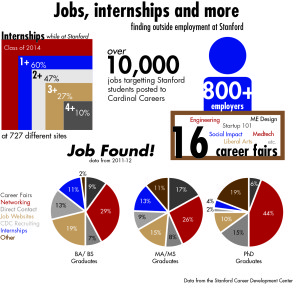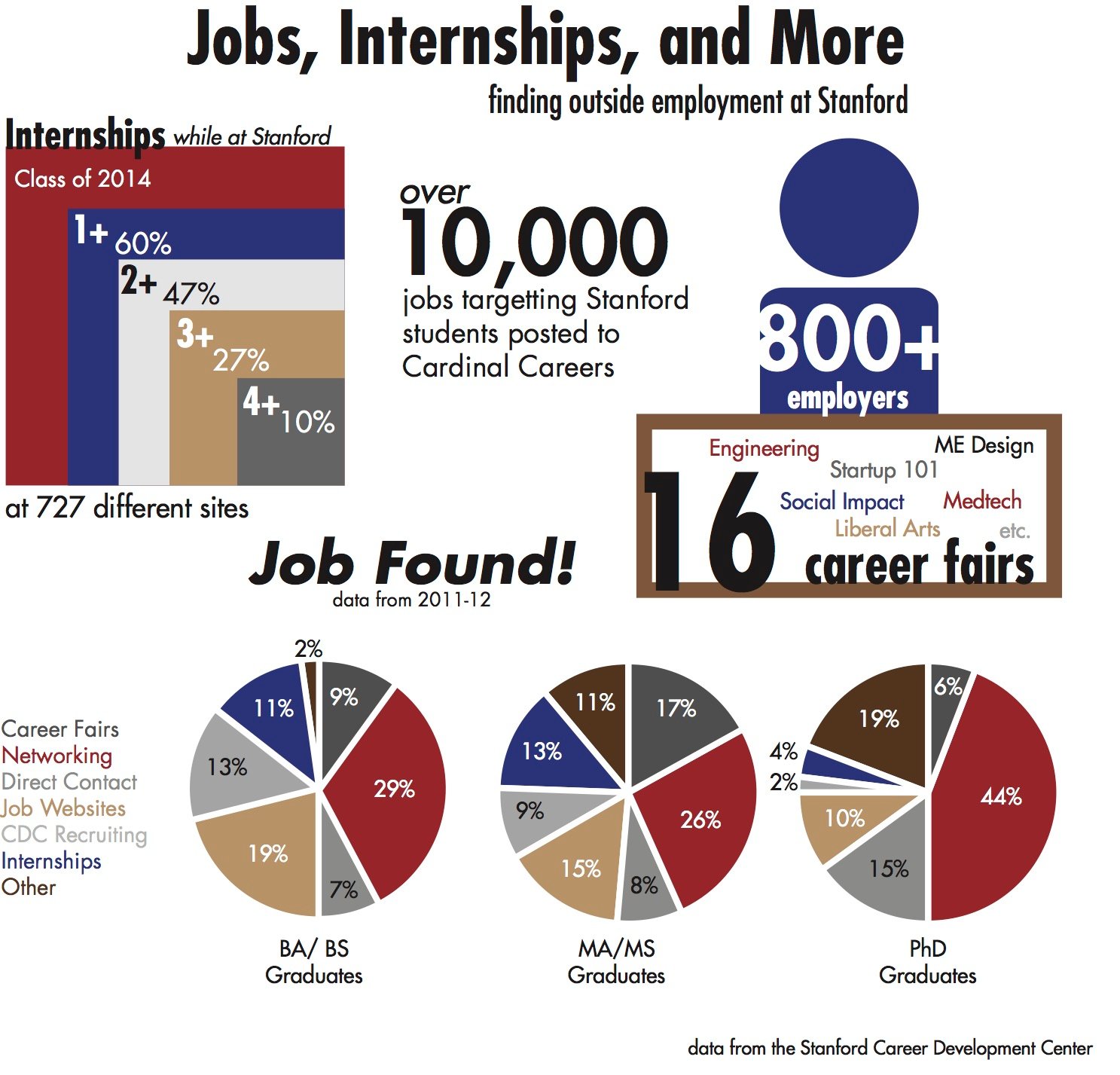
As summer approaches, many Stanford students feel pressured to find an internship for the three-month break. In this job search, however, many students feel the opportunities are disproportionately geared toward tech positions.
As one example, Lilliana Lorén ’16 noticed the general internships offered on Capital One’s website listed several different kinds of positions including brand management and marketing. However, the moment she selected her school, Stanford University, as a filter on the dropdown menu, the only remaining position available was a technical one that required software skills.
When Lorén contacted the recruiter to ask why only the technical position was available, she was told “that’s because [they] only recruit for that type of internship from Stanford.”
Although Lorén was able to apply to the management and marketing positions after requesting access to non-technical opportunities, she feels this is reflective of a larger problem.
“How blatant is that?” Lorén said. “It’s like there are companies who, despite having other opportunities and other types of internships available, look at Stanford and think, ‘We’re only going to recruit for CS [computer science] candidates.’”
Lorén indicated her concern over Stanford not pushing companies to provide equal opportunities for students with different majors.
“[Stanford should tell them] you can recruit for your technical internships if you also post non-technical internships,” she said. “We all know they exist; we all know Twitter has marketing people; we all know Facebook does, too. But where the internships are – no one knows.”
Fields of study can also play a role in students’ job opportunities, and Lorén observed substantial obstacles for “non-techy” majors, such as Science, Technology and Society (STS), that are often tricky to explain because they do not consist of clear, technical, hard skills.
Mark Mendoza ’18, who got a technical internship at Facebook for this summer, explained that the high demand for engineers and computer science majors played a large role in his major choice.
“I didn’t start out as a CS major. Going to the first job fair as a prospective chemical engineering major, everyone was looking for CS majors,” Mendoza said. “I remember talking to an oil company – a classic chemical engineering place – and even they were recruiting for computer science.”
Rohit Talreja ’15 believes that being an engineering major opens up many paths for summer internships, mainly through career fairs and recruitment events.
“It is especially stressful for my friends who are not engineering or who don’t have what I would consider a ‘specialty’ degree – a degree with its own field and with its own very established job market and career path,” Talreja said. “I heard that at the medical technology fair, all they wanted [were] coders and solidworks people, and if you couldn’t do that, then it didn’t really matter [what] your degree was… because those companies would say, ‘Yeah, we don’t really need you, we need programmers.’”
Over his four years at Stanford, Talreja has noticed an increase in focus on high-tech fields, particularly among the different recruiting companies that come to campus career fairs and events. He explained that this increase has made it even more difficult for humanities majors to find summer internships.
However, he also spoke about the fact that, for technical majors, there may be more competition involved with actually getting the job.
CDC offers resources for the job search
According to John O’Neill, Assistant Dean and Associate Director of Career Communities at the Career Development Center (CDC), the Career Development Center offers many resources to help students find jobs and internships not only in technical fields but also in humanities and social sciences. He indicated that, in addition to their online database called Cardinal Careers, they hold career fairs, some of which focus specifically in these non-tech fields.
This winter quarter the CDC had two such career fairs: the Liberal Arts Career Fair and the Social Impact Career Fair. O’Neill explained that the CDC’s career ventures team includes an associate director who works specifically with arts and entertainment employers.
“We have also brought employers that have humanities and arts opportunities to campus,” O’Neill said. “Most recently NBC Universal [and] Disney [were] here to share with students about different opportunities. We’ve also brought Google to talk about non-technical opportunities.”
According to Sheetal Patel, the Director of Branding & Digital Communities at the CDC, there are several CDC members that not only reach out to employers with non-tech jobs, but also work with partners across campus and student groups (one example is the Arts is My Occupation program), including alumni employers to seek out these opportunities.
Alex Mullin ’15 expressed overall satisfaction with the CDC’s resources and encouraged students to use the CDC’s website during their job searches.
“You’re not guaranteed to find a job on there, but it’s a lot of opportunities and people who want Stanford students,” Mullin said.
Nevertheless, several students expressed that they found the CDC’s resources insufficient and in need of improvement.
According to Julia Rosedale ’18, the liberal arts career fair was not as humanities focused as it could have been.
“I feel like the [University] [is] pushing arts, but it’s a binary of super-techie and arts, and [there is] nothing for people in between,” Rosedale said. “I have heard so many things about CS and business-related opportunities, but I have not seen anything directly through psychology or other things.”
Rosedale and several other students also pointed out that even if there are opportunities for different fields of study, they feel like neither the CDC nor the University makes enough of an effort to make them stand out to students. As a result, it falls on students to dig out opportunities and find jobs and internships on their own.
“They don’t push it; you have to go look for it,” Rosedale said.
Natty Jumreornvong ’17 agreed and added that making connections through fairs and reaching out to professors have been really helpful strategies during her job search process.
Patel, on the other hand, explained that several humanities and sciences students were satisfied with the companies present at the Liberal Arts Career Fair, and said that she hoped to hear from students who weren’t.
“We would love to hear who students want to meet with, so we can find those connections and bring those employers to campus,” Patel said.
Patel pointed out that CDC’s Humanities & Sciences Community Team as well as all other teams, send out a newsletter once a week with job opportunities specific to these students. Student Service Administrators in departments are made aware of opportunities, and Communities Counselors also run meet-ups several times a week, where these opportunities are advertised.
Other barriers to finding summer work
Yet, there are problems other than the lack of industry breadth and the focus on high-tech fields. According to Jumreornvong, who is from Thailand, being an international student poses a major obstacle to finding internships in the United States, primarily because of the need for a visa.
“I talked to some employers, and they were very reluctant of hiring me at first,” Jumreornvong said. “[It’s] definitely a double standard… One Genentech employer outright told me, ‘We don’t really hire international students.’”
Although Jumreornvong was eventually offered an interview at Genentech and will likely intern at the biotech firm this summer, as well as working on her own start-up company, she highlighted how the job search can cause an overwhelming amount of pressure on students.
“I just think the process is really stressful,” Jumreornvong said. “So maybe in addition to helping Stanford students get contact to internships, there should be more emotional support for students to be able to go through that.”
The CDC officials, however, stated that they do have counselors on staff to support students during the job search process.
This article has been updated with information provided by the CDC.
Contact Sevde Kaldıroğlu at sevde ‘at’ stanford.edu.
